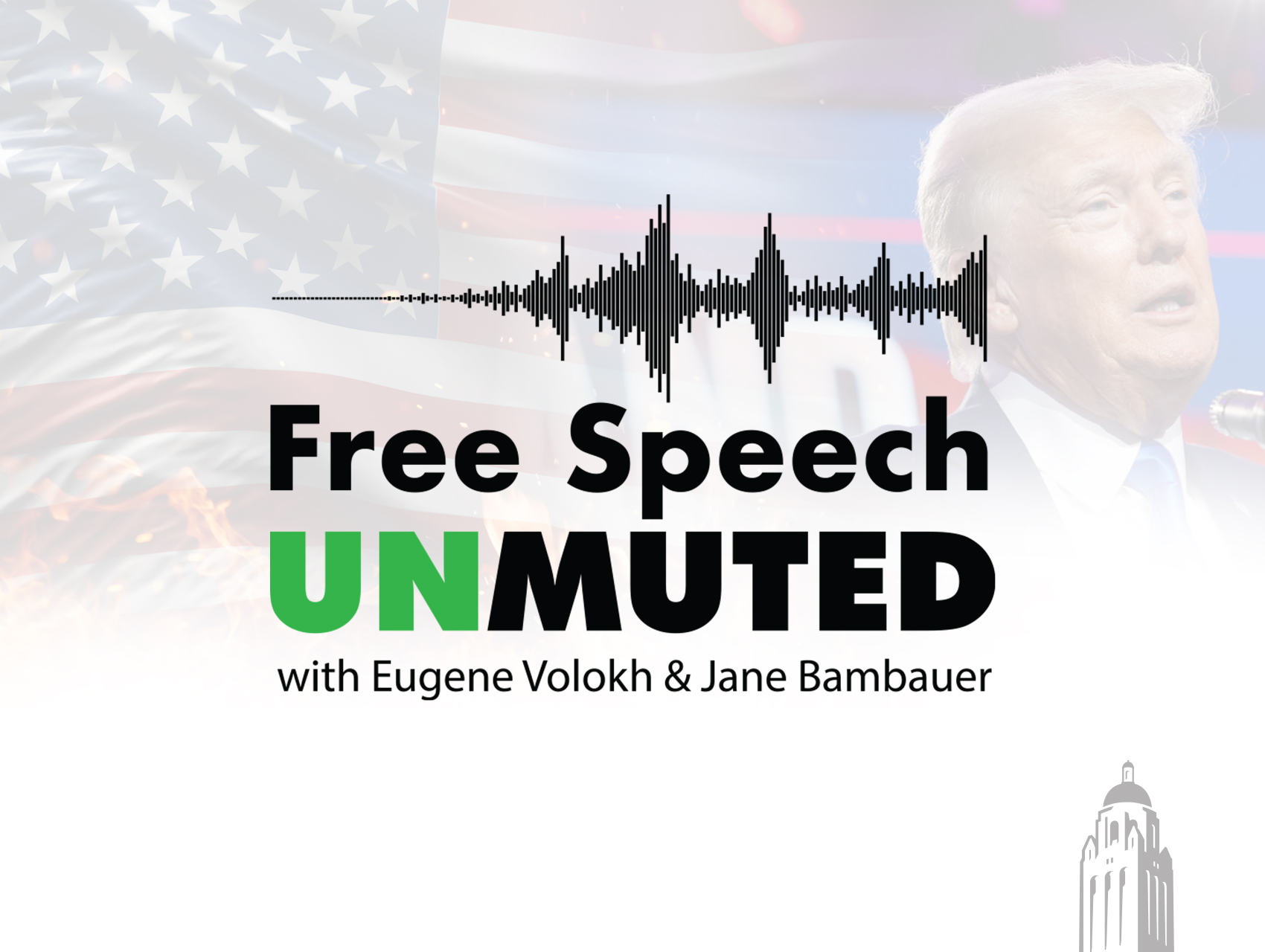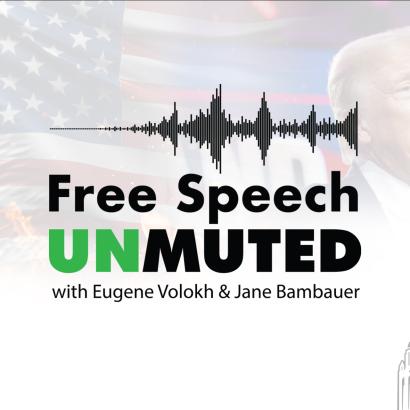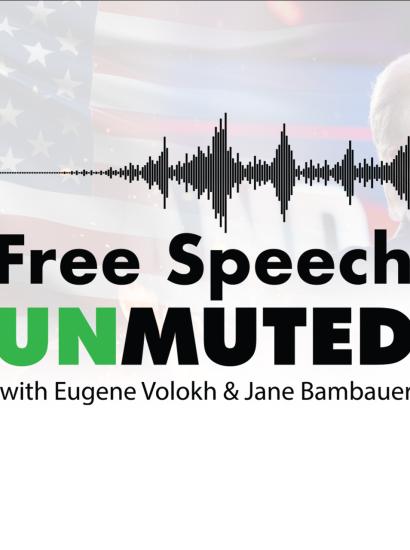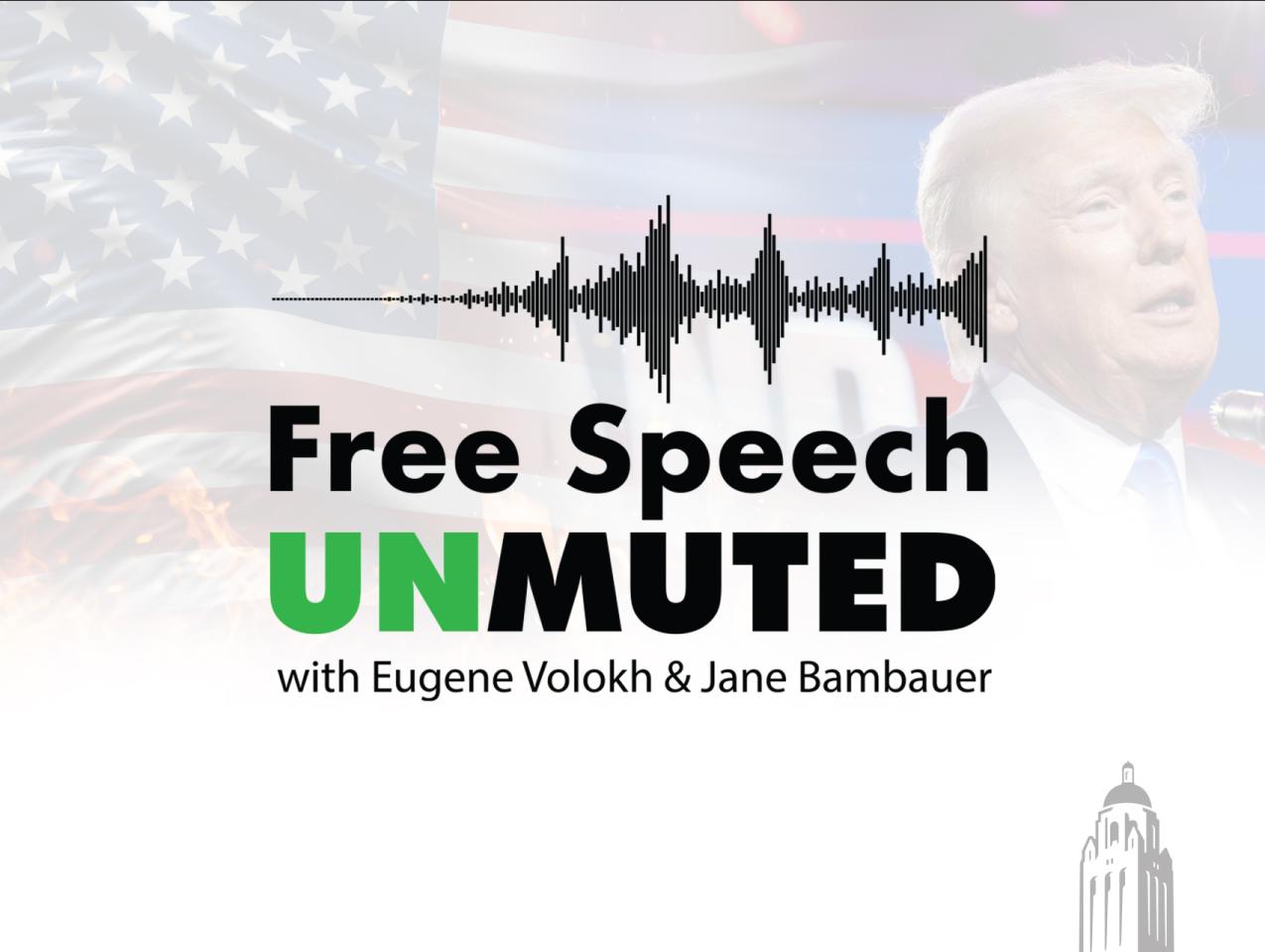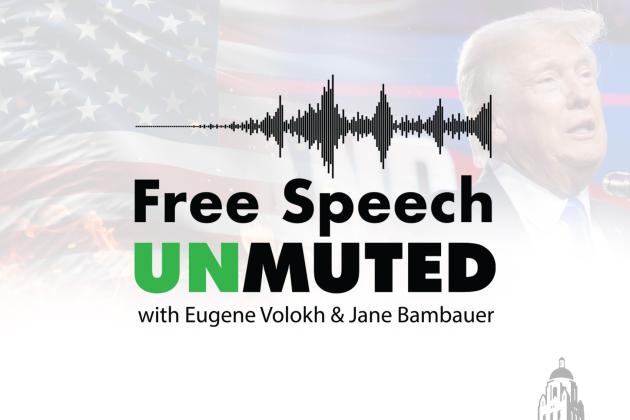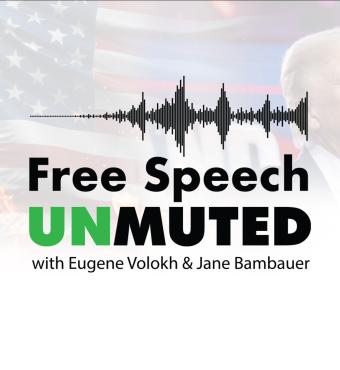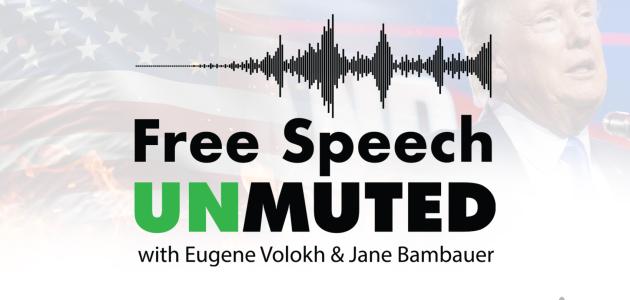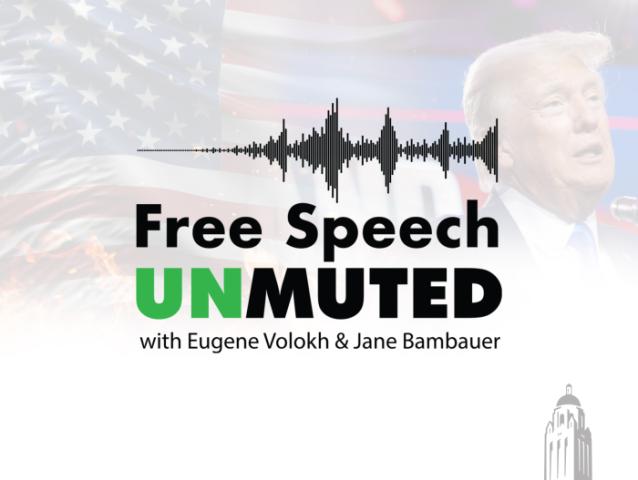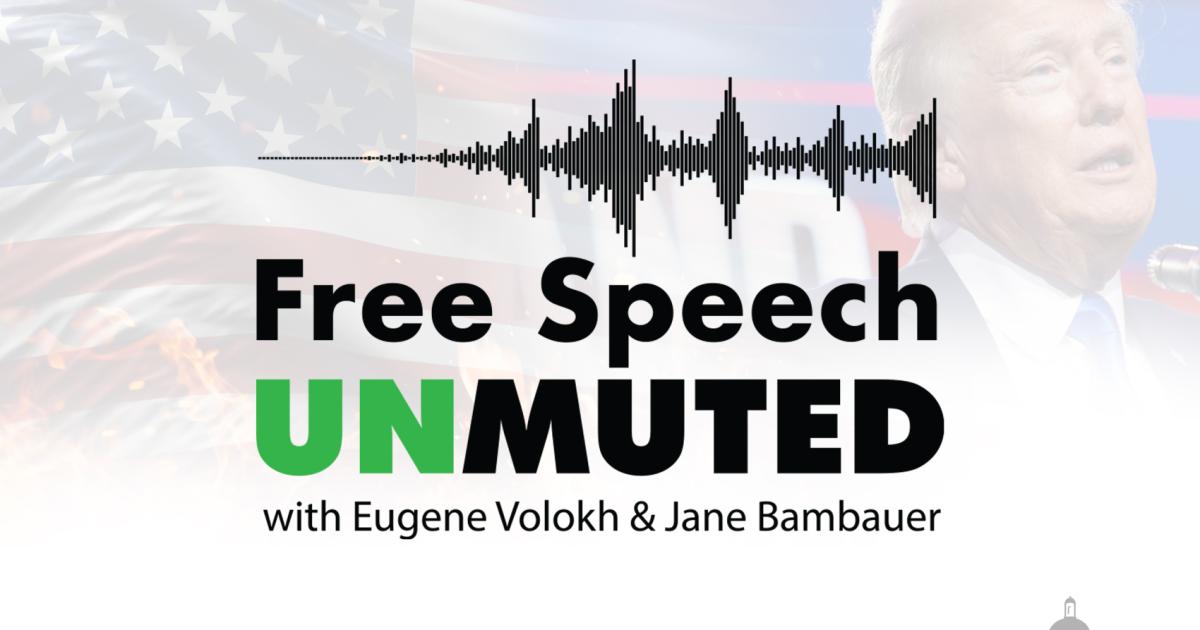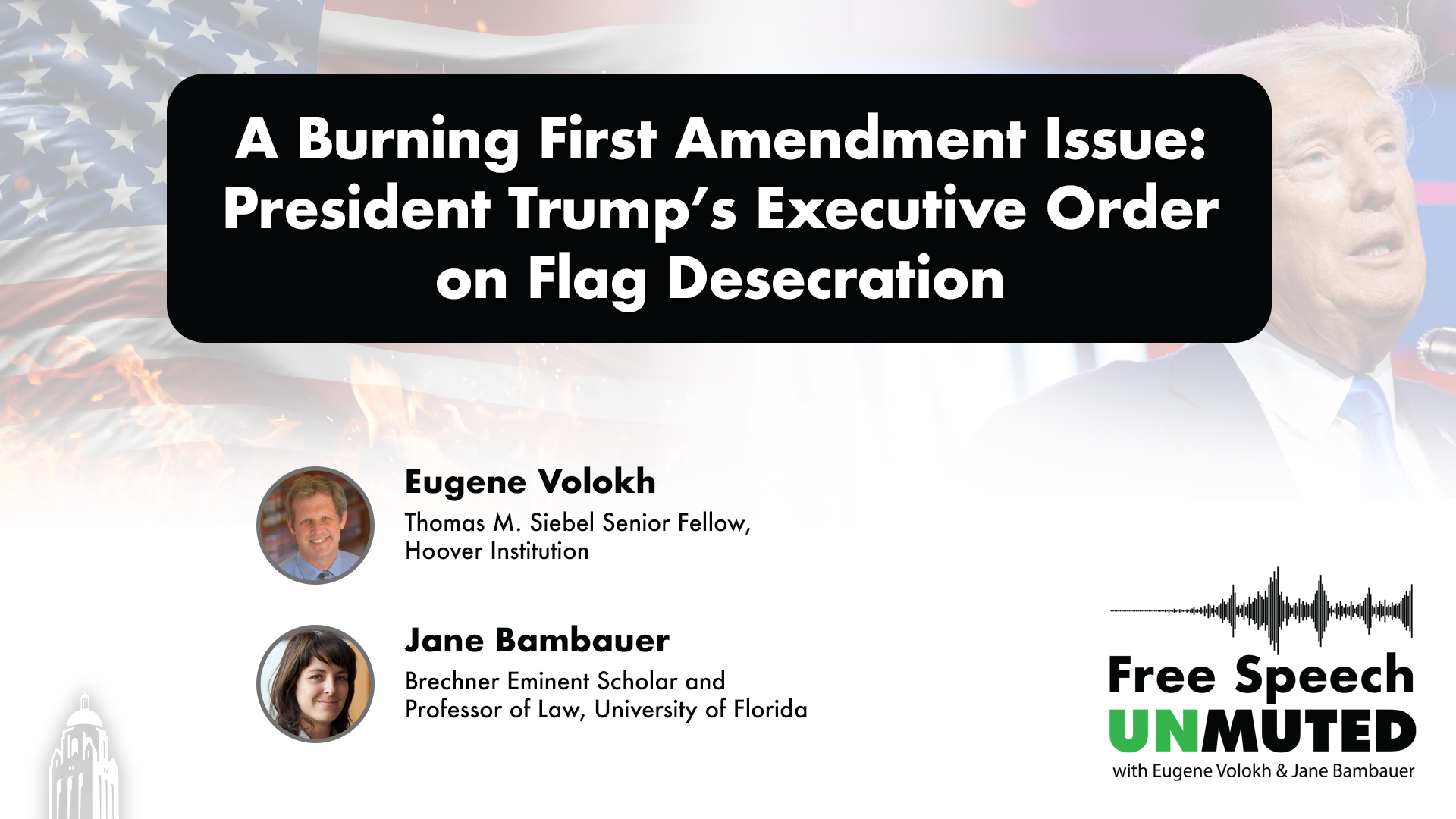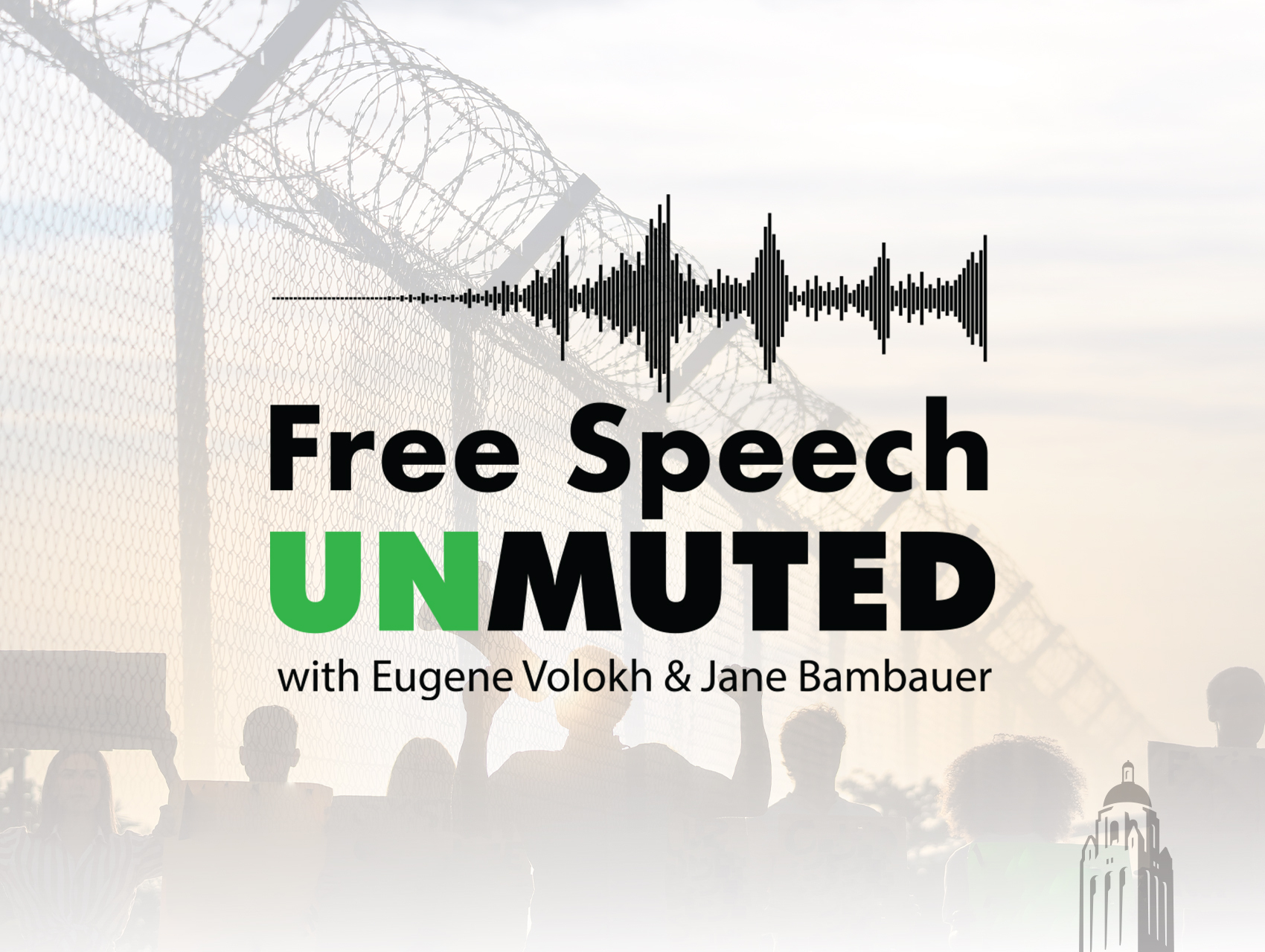- Law & Policy
- Revitalizing American Institutions
In this episode of Free Speech Unmuted, hosts and law professors Eugene Volokh and Jane Bambauer dive into President Trump’s new executive order on flag burning. Is it bold politics or bad law? Or maybe both? They break down what the order really says, how it clashes with First Amendment precedents, and why targeting flag desecration even under otherwise content-neutral laws could violate the First Amendment. Jane and Eugene also discuss the tricky question of whether non-citizens can be deported for speech or symbolic expression that is protected for citizens (more on that in this Free Speech Unmuted episode).
Recorded on August 26, 2025.
>> Eugene Volokh: Hello, welcome to Free Speech Unmuted. My co-host is Jane Bambauer of the University of Florida. I'm Eugene Volokh of the Hoover Institution at Stanford and emeritus at UCLA Law School. Today we have a especially timely episode because it's about Mondays, or rather, to be specific, Monday, August 25th.
We don't know when you're listening to this, but Monday's release of an executive order from President Trump, and the title of the order is Prosecuting Burning of the American Flag. And people might say, well, wait a minute, didn't Supreme Court say that there's a First Amendment right to burn the American flag?
Well, yes, it did. Yes, it did. Turns out the order tries to avoid that decision in some measure, although at the risk of ruining the suspense. So we think, or at least I think, I don't know what Jane thinks. I think that it probably doesn't really avoid the First Amendment problems.
So let's quickly go through what the order does and doesn't do, and then we'll talk about what it can and can't do. Jane, actually, do you want to do that or shall I? I'm fine.
>> Jane Bambauer: Sure. So, yeah, why don't you go over the order, and then we'll say.
I'll say a little something about how Trump made things a little bit confusing because of statements he's made about the order. So go ahead. Why don't you summarize? The order.
>> Eugene Volokh: Makes sense. So the order begins with talking about our great American flags, the most sacred and cherished symbol of the United States of America and of American freedom, identity and strength.
And then it goes on in much the same vein, but in the process, it also explains that desecrating the flag is uniquely offensive and provocative. It's a statement of contempt, hostility, and violence against our nation. The very fact that it says that actually becomes relevant to the First Amendment analysis somewhat later.
It then acknowledges that the Supreme Court has had rulings on First Amendment protections, but says, notwithstanding that the court has never held that American flag desecration, conducted in a manner that's likely to incite imminent lawless action or that is amounting to fighting words, is constitutionally protected. That actually turns out to be technically true, although I don't think it does the work that the order expects.
So far. This is just a statement of purpose. Then Section two is the measures to combat desecration of American flag. That's what really explains what the order is aimed or what the orders to actually do and not just say so. It starts by saying the attorney General shall prioritize the enforcement to the fullest extent possible of our nation's criminal and civil laws against act of American flag desecration that violate applicable content neutral laws while causing harm unrelated to expression consistent with the First Amendment.
And it includes various things, including crimes against property and crimes against the peace. So on its face, this provision doesn't purport to outlaw flag burning. Rather, it says if flag burning is already illegal under some law, like, for example, stealing a flag and burning it is of course illegal.
It's theft. And if it's a federally owned flag, it's a destruction of federally owned property. So it says when it's already illegal, the enforcement of those laws shall be prioritized when they involve flag desecration, which by the way, can mean flag burning, but also some other actions with regard to the flag.
Then it says that if the Justice Department or another federal agency determines that it may violate that flag desecration, may violate state or local law, it shall refer the matter to the appropriate state or local authority for potential action. Again, here, it's not actually purporting to outlaw something that is currently legal, it's just saying refer it to state officials.
And of course, executor can't, generally speaking, outlaw that which is already legal. Then to the maximum extent permitted by the Constitution, the Attorney General shall vigorously prosecute those who violate our laws in ways that involve desecrating the flag and may pursue litigation to clarify the scope of the First Amendment exceptions.
And then, I'm sorry, actually, let me say a little bit about that. So that seems to suggest that maybe, maybe the government, the Justice Department, will be trying to persuade the court, cut back on protection, maybe even overrule protection.
>> Jane Bambauer: For that, but again, or seek a new exception.
It sounds like it's a new unprotected form of speech.
>> Eugene Volokh: Right, though, again, note, the order doesn't say.
>> Jane Bambauer: Correct.
>> Eugene Volokh: It's illegal to burn a flag.
>> Jane Bambauer: Right.
>> Eugene Volokh: Can't say that. But it's sort of urging the government to kind of push to narrow whatever protection might be present, which of course, the Justice Department is entitled to do as a matter of its, of its litigation strategy.
Of course, consistent with legal ethics. It can't, it can't just deny the existence of existing precedent, let's say, and the like. And then the fourth section, which is probably the one that will have the most direct effect, is that Secretary of State, Attorney General, and Secretary of Homeland Security shall deny, prohibit, terminate or revoke visas and various other immigration benefits whenever there's been or seek removal from the US So seek deportation pursuant to federal law whenever there's been an appropriate determination that foreign nationals, so non citizens, people who are not U.S. citizens, have engaged in American flag desecration activity under circumstances that permit the exercise of such remedies pursuant to federal law.
So what it's saying is kind of just as we've been going after people who've been saying various things, or aliens, non citizens who've been saying various things to the extent we think federal law allows us to, say, deport them for that, the same should be done when they burn the American flag, so long as that is consistent with federal law.
Just to foreshadow a little bit of the constitutional discussion, it turns out that here the First Amendment law is unsettled. First Amendment law is quite well settled that flag desecration cannot just be outlawed simply because it's flag desecration. It's well settled. As to other matters, we'll get to later.
But it's unsettled, as we talked about in a previous episode, with regard to speech by aliens or expressive symbolic expression by aliens like flag desecration. So this is something. Again, I can't say this provision is clearly unconstitutional. Maybe it should be seen that way. Maybe it, a court, the Supreme Court maybe eventually will say that it's impermissible to deport aliens, let's say, for symbolic expression, that's constitutionally protected for American citizens.
But I think we have to candidly say that that is an uncertain.
>> Jane Bambauer: And on that, on that issue, if listeners want to understand why that is unsettled, they could listen to the episode that we did about Mahmoud Khalil, the Columbia student whose visa. Well, actually, no, he.
He actually wound up getting his. It's even a harder case because he wound up getting his citizenship. And they're trying to reverse it. But in any case, did he get. No, you're right. It's a, it's a. It's a green card. He got his permanent citizen. He. He did have a permanent residence.
>> Eugene Volokh: Right. Right, and- So- We're gonna include the exact title of that episode and perhaps a link to it, if that's possible, in the show notes.
>> Jane Bambauer: Good. Yeah. Okay, so adding some complications. So, so Eugene just described what the executive order does, which is what we're going to focus on from now on.
But. Or, you know, after. After my little spiel. But, but adding to the confusion is that upon signing this executive order, Trump, President Trump kind of exaggerated what it was that he. That it. That the executive order attempts to do, or. I don't know, I don't even think it's fair to call it an exaggeration, because what he said is if you burn a flag, you get one year in jail.
And he said, you will see flag burning stop immediately. And so, so he was implying that there's, you know, he was signing something that just provided a general ban and, you know, criminal liability based on burning a flag, period. Or at least, you know, he wasn't adding much nuance to it.
And, and his anticipation that flag burning should stop immediately, that too suggests that he's expecting some sort of crackdown like this. This order would enable prosecution of flag burning almost wherever it occurs. So.
>> Eugene Volokh: Right, although some people claim and I don't know, but it's not implausible, is the one he's really expecting is that his enemies, generally on the left, will start burning more flags.
>> Jane Bambauer: I, you know, I, I think that that's not only plausible, but very good politics.
>> Eugene Volokh: Exactly, exactly. And whether or not he can prosecute them, he's going to have a political, A political victory.
>> Jane Bambauer: Yes. All the better if he can't prosecute them.
>> Eugene Volokh: Exactly, exactly. So that, that is perfectly possible.
And again, as you point out, would even be good to good, whether it's, whether it's good statesmanship or not.
>> Jane Bambauer: No, no, I do not mean that. I mean good, very effective politics. Okay, so let's maybe starting the discussion of the background case law. We already talked about, Johnson, the, The flag brain case.
But, but another example, in addition to just sort of general prohibitions on, for example, starting a fire in a public place and then using that to bootstrap this flag burning, the order also says, well, if you're burning a flag in a way that constitutes incitement, well, then, then, you know, prosecutors should go ahead, you know, focus on those cases and make sure to prosecute them.
And so the first thing I wanted to ask you, Eugene. I'm pretty sure I know the answer, but if there's a, if there's a form of expression that's already unprotected, and then, And Trump is simply directing the government to take that form of already unprotected speech and, and prosecute it, possibly to the exclusion of other types of incitement.
Does that get a free pass from the, from the First Amendment?
>> Eugene Volokh: No, it does not. So this is the, this is the, the problem with the rationale behind the order. The rationale behind the order recall is some kinds of flag burning are already unprotected. For example, if you steal a flag that can't be protected or if it's fighting words.
Fighting words involves personal face to face insults. Not just offensive political statements, but personal insults. Hard to imagine just how that would have, but I could imagine somebody burning a flag and saying to someone, let's say this, you're essentially, let's say, insulting the person and in the process burning the flag and maybe tying it to the personal insult.
>> Jane Bambauer: Right, yeah. But you can argue that. Doing it in front of a service person, service member.
>> Eugene Volokh: Maybe, but then you also have to be, it's not just that I'm doing it in front of a service member, it has to be tied with personal face-to-face insults, something else.
Let's go after it. Specially because it's flag burning and that kind of selective enforcement based on the content of the message and based in fact on the viewpoint of the message. Because again, the executive order starts talking about how this is so offensive and so bad that is itself unconstitutional.
So let's start with a content neutral law, a ban on defacing federal property. Imagine somebody takes a federally owned flag and burns it. Okay, that law is constitutional when applied to burning an American flag because it's content neutral. But when the government is essentially saying we are prioritizing going after it because of the message, that makes the law essentially content based and viewpoint based in enforcement and thus makes that enforcement unconstitutional.
Not just my speculation, consider Supreme Court's opinion in McCullen v. Coakley, a 2014 case involving restrictions on speech outside abortion clinics. The court actually struck down those restrictions, but it said they are content neutral because they apply equally to everybody pro abortion or anti abortion. But if the police do not enforce the law equally against clinic escorts and instead selectively target anti-abortion protesters, quote, such allegations might state a claim of official viewpoint discrimination, close quote.
So the court was saying look, or the majority of the court was saying, look, this law is content neutral, but on its face, but that we'll only treat it as content mutual because we're not seeing any evidence of, of viewpoint discrimination and enforcement. Then the court favorably cited, no, no, then right around there, the court favorably cited a Ninth Circuit case Hoye v City of Oakland from 2011, which involved similarly a content neutral ordinance.
But there there was evidence that was selectively enforced against anti abortion protesters. There was a city policy essentially that took this facially content neutral ordinance and selectively enforced it against anti abortion protesters and hoy. Again, the case that the court favorably cited says Oakland's enforcement policy is a constitutionally invalid content based regulation of speech.
By adopting that policy, Oakland has taken sides in a public debate in a manner that the Constitution does not permit. Exactly the same would apply here that a ban on defacing federal property is facially content neutral. But if there's a policy for prioritizing enforcement against flag burning, then in that case, that policy is a constitutionally invalid content based regulation of speech.
Or consider the opinion from 2023 by Judge Naomi Rao. Very smart, I think. Well respect Judge I respect her very much. A Trump appointee from his first term, DC circuit judge. So she wrote this opinion for a three judge panel in a case called Frederick Douglass foundation versus D.C. and the case concerns, I'm quoting here, constitutional challenge to selective enforcement of the District of Columbia's defacement ordinance against some viewpoints but not others.
Apparently at least the allegations were the D.C. allowed people to write Black Lives Matter on various streets, sidewalks, storefronts and such, but did not allow the plaintiffs to have a black priest Reborn Lives Matter message to have them right in the same similar places. As this Black Pre-born Lives Matter message, so yeah, an anti-abortion message.
And the DC circuit says in this opinion by Judge Rao, look, the defacement ordinance may be perfectly neutral on its own. But the foundation here has plausibly alleged the District discriminated on the basis of viewpoint in selective enforcement of its defacement ordinance, exactly the same language. I mean if I were the lawyer for a flag burner who was prosecuted under this policy, I would just quote that, quote that language from boy, quote that language from McCullen, quote the language from Judge Rao's opinion and say, look, just as selectively targeting anti abortion messages for special enforcement, selective enforcement, even under facially content neutral ordinances, unconstitutional, likewise selectively targeting anti American messages is, is, is unconstitutional.
>> Jane Bambauer: Let me ask you a couple clarifying questions. So the case of HOY that the Supreme Court cited to, and by the way, let me first ask the Supreme Court's citation to HOY is the closest we get. Like we don't have a case where the facts before the court are clearly on point here.
They've rather, they've cited a case where there was such a policy of selective enforcement and they decided approvingly. Okay, right. So, but HOY seems different still from the Frederick Douglass foundation case in the following way that at least in HOY there was some, my understanding at least is that there was some evidence like a written policy, like, or even if it's an unofficial policy, was still written and therefore, you know, there was evidence in the record that, that this was what the, the police planned to do.
Whereas in Frederick Douglas foundation, my impression from what you just said is that there was no such, okay, express evidence, but rather there was a pattern of non enforcement except for this message. So that's very interesting because it's, it's allowing evidence of a human history or pattern of selective enforcement to do the work of, of showing viewpoint based enforcement.
Even though if you think about like the police force, it's an amorphous blob of lots of different people making lots of different decisions. I could imagine, I could imagine the court, I'm glad they didn't, but I could imagine a court going the other way and saying, look, you can't prove that this police officer would have, would have let the other messages go if he happened to see that, you know.
>> Eugene Volokh: Right, there is the law, and then there is what you can prove.
>> Jane Bambauer: Yeah, right.
>> Eugene Volokh: Right. So, so you're absolutely right that, that there is this difference that has a practical effect. As a general matter, selective enforcement claims are permissible or that is to say, can be brought in order to try to, to defend against a, a prosecution.
They can be brought whether or not there is a written policy of selective enforcement. It's just that if there isn't such a policy, it's not easy to prove, especially since lots of people sort of say, I was pulled over for speeding because they didn't like my license plate.
No, maybe you just were speeding. Well, what about other cars that weren't speeding? Well, they can't pull over everyone, right? So a lot of people make selective enforcement claims. Usually it goes nowhere because there's not enough evidence, and courts usually require a lot of evidence. But in Hoy, there was in fact evidence of an official policy that was present.
And guess where else there is evidence in an official policy? An executive order. In President Trump executive order, it's right there in Section 1. It's saying essentially it's not just like President Trump calls up his ag, says, you know, spread the word to your US Attorneys that they spread the word to their people.
You know, I want something done about flag burning, wherever that's possible, you know, even that presumably somebody would blow the whistle and there'd be some evidence, but at least, you know, might say, well, I don't know, is there really proof of that? What if it was done in a really subtle way?
Maybe there wouldn't be enough proof. But here he's putting the proof down in writing that, that the federal prosecutors shall prioritize one particular kind of defacement of property that sends a particular kind of highly offensive message. The executive order says. So, so this is, again, if I were the lawyer for a, for somebody being prosecuted for flag burning after this policy is instituted, I would say, well, we know, we know why this was done, because this is what the executive order says says.
So right there.
>> Jane Bambauer: Okay, one more, one more question, if you don't mind.
>> Eugene Volokh: Never mind.
>> Jane Bambauer: So the flag burning cases, Johnson and Eichmann, they sort of stood on the shoulders of the O' Brien case that was decided in the 60s. And O', Brien, you know, listeners are probably familiar with it, even if you don't know the name of it.
It's the draft card burning case. That was the case where the Supreme Court, you know, most clearly recognized that that conduct can be expressive and protected on the basis of its expression. You could, you know, it's, it's often described as an expressive conduct case that makes clear that, that that kind of creates.
Well, I think the best way to understand O'Brien is that it says that even a content-neutral law, if enforced for content, if enforced against someone who's using the conduct to express a message, could violate the First Amendment, even though the law that's being used against them is a regulation of conduct.
But o', Brien, the reason I want to bring this up is that something, you know, o' Brien never sat well with me because it seemed to me that o' Brien was an example of selective enforcement, that the court did its best to explain that, no, the government really does care.
They don't want people destroying their draft cards and their certifications, you know, their proof of registry with. But if you look at the Congressional Record, it seemed that they were worried basically about two things. One was people using these cards to claim to be other people. So basically, basically, you know, false imperial impersonation, or the other thing that comes up is like, you know, defiant destruction of the draft cards.
So I'm wondering if, if o', Brien, you know, do you feel the same way about o' Brien or is it. It's probably, it's probably better for my mental health if I just assume what the court insists was true, which was that, no, this was not select. This was not.
This was not enforced based on the message. It was just kind of an enforce. You know, it was an act of enforcement that the police would have done anyway.
>> Eugene Volokh: Right, so O'Brien, which is a Vietnam War case, involved a federal statute which, which generally speaking, prohibited destruction of draft cards.
By the way, what didn't it do, didn't prohibit discretion of copies of draft cards, if you want to burn a copy of a draft card, you're free to do that. The theory behind the law, at least as the court accepted it, was a draft card is a government document.
It's not necessarily a matter of property as such, but it is a government document that the government issues. It plays an important role in the selective service registration system, you can't destroy this government's document, again, you can destroy copies if you want, you can't. But you can't destroy it in public or in private, it doesn't matter what.
Even if you destroy it for non symbolic purposes, you just don't want to have it on you or whatever else, you can't do that. There was some evidence in the legislative history that some of the legislators who voted for it voted for that law. Because they were outraged by the message sent message of defiance and lawlessness.
They saw essentially ascent by the, the burning, the especially the public burning of draft cards, but that was just a few of the legislators, and the court said, look, this law is on its face content neutral. In fact, it's speech neutral, it applies to symbolic or non symbolic expression.
It the fact that a few legislators may have backed it for ideological, because they didn't disapprove of the ideological message, you know, that can't be enough to invalidate it. There were after all, hundreds of legislators who voted for it, and as you point out, in principle there might be sometimes some exceptions.
Even from content neutral restrictions on symbolic expression when they're applied to things that have, that have expressive value. But you know, we give a lot of deference to the government when it enforces content neutral laws and this is one such law. So you may agree or disagree, maybe, maybe the court should have said, well, we know what's really going on with this law.
It's really aimed at suppressing a message.
>> Jane Bambauer: Or even as applied in this case, or as applied.
>> Eugene Volokh: I mean, I have no particular reason to think that there was a policy of prioritizing a prosecution of people, let's say, who publicly burned the draft card. It may just be that much of the time the prosecutors have no idea that someone's destroyed his draft card.
But if he destroys it in public and makes a big public thing of it, well, that's when they know. So in any event, so you may agree or disagree with O' Brien, but the court in Texas v. Johnson said, look, this law, the ban on flag Desecration is, is based on content.
The harm is not that there's some government document that's being destroyed or a government flag that, excuse me, government owned flag that's being destroyed. It applies even to privately owned flags, people can create privately owned flags, they can, because it's just privately owned. They have a First Amendment right to symbolically destroy them as well, and any attempt to restrict that has to be simply a mechanism for, for going after the message, I think it's probably right.
By the way, some people say, well, wait a minute, why are we even talking about this under the free speech clause?, because burning a flag isn't speech. And I just thought it was worth mentioning this in part because I wrote an article about this very issue quite a while ago now.
And law professors always love to talk about their articles, but I do think it's relevant. I actually looked at the history of how American law and before that English law dealt with symbolic expression. Both for purposes of protecting it, but also purposes of restricting it under things like libel, libel law.
And it's quite clear from before the revolution to right around the revolution to after the Revolution, symbolic expression was treated as. As basically functionally identical to verbal expression and pictorial expression. So for example, it could be a libel to burn a person in effigy when you're basically conveying a defamatory reputation damaging message about the person.
Painting a man with a-
>> Jane Bambauer: Seems like pure opinion to me, but go ahead.
>> Eugene Volokh: Pardon?
>> Jane Bambauer: Seems like a pure opinion rather than statement of.
>> Eugene Volokh: Today It would be treated as probably as opinion, but back then certain kinds of opinion would be actionable. Or painting a man with scap or coat or with horns or asses ears, donkeys ears, so that's pictorial expression.
Likewise for more symbolic expression, placing a wooden gun at an officer's door, thereby implying cowardice, that too was treated as basically tantamount to verbal expression. And likewise, when it came to discussions of constitutional law, it was quite routine for them to be treated the same. For example, the very first American court opinion that held a speech restriction unconstitutional on free speech or free press grounds actually discussed a painting as tantamount to a printed book for free speech purposes.
Going forward from the framing era, the very first Supreme Court opinion that struck down a government action on freedom of expression grounds. Basically First Amendment, but as applied to the states, to the 14th Amendment, was Stromberg vs California in 1931, it was a symbolic expression case. It involved a law that banned the use of, I think essentially red flags as a symbol of a position to organize government.
The very first law case that struck down something as a speech compulsion under the First Amendment was West Virginia Board of Education versus Barnett in 1943. Also involved together with verbal expression, symbolic expression there, the flag salute. So Texas v. Johnson rests on very, very firm footing in American history and American precedent as protecting a symbolic expression when it's targeted because of what it communicates the same way as protect as it protects verbal expression.
>> Jane Bambauer: Very good.
>> Eugene Volokh: So there's something else I want to mention because you asked or you talked about this earlier, Jane, want to make sure we bring this in. So so far I've been talking about content neutral restrictions, like the classic example is a ban on, on destroying federal property or as you pointed out, a ban on burning things.
There's actually a case from Ohio, Ohio Court of appeal from 2003, where somebody was prosecuted for burning a flag. He just was prosecuted under a generally applicable fire prevention ordinance and didn't have any evidence. There was some selective policy of targeting things. I think a lot of law enforcement people in areas I not only come from California don't come from California, I've lived 50 years in California.
Not only that, but until a few years ago, we lived in the Pacific Palisades, the very Pacific Palisades, which has now burned down, thankfully for us, after we sold our house there. So when there's law enforcement in an area of fire hazard, they, they take it in view of people burning objects, whether they're flags or not, so those are content neutral restrictions.
But what about bans on incitement of violence or bans on fighting words? Again, these personal insults that can lead to violence, they're not technically content neutral, but they are permissible. That is, say, those bans are permissible. But again, selectively enforcing those bans as a policy against particular messages is also unconstitutional.
And the Supreme Court made that clear in a case called RAV the City of St. Paul in 1992. There, the City of St. Paul had not the general ordinance banning fighting words, again, personal face to face insults that are likely to cause a fight.
>> Jane Bambauer: They did not have a general ordinance.
>> Eugene Volokh: Their ordinance wasn't that. The ordinance they were applying wasn't that general.
>> Jane Bambauer: Was not that.
>> Eugene Volokh: Instead it was a selective ban that targeted fighting words that angered people based on race, religion and the like. So essentially it's say bigoted, or prejudiced fighting words. And the supreme court by a 5, 4 vote, but said, look, it's unconstitutional to selectively target subsets of fighting words exception based on viewpoint or even based in most situations on content.
Again, that would apply fully to this very law, a very law, excuse me, very executive order, that if the prosecutors are prosecuting fighting words or incitement because it violates a general law against fighting words and incitement. And that's all the evidence that there is, well, they're entitled to do that because there are First Amendment exceptions, not narrow ones for fighting words and incitement.
But if it's clear that they have a policy of prioritizing fighting words or incitement that convey this offensive message, offensive anti-American message, that very policy makes that persecution potentially unconstitutional selective enforcement. So I do think there was an attempt to try to write this executive order in a narrow way, in a way that wasn't clearly contradictory of to Texas v Johnson.
I appreciate that, but I don't think it ultimately succeeded because in the process of prohibiting or prioritizing fighting words. Excuse me, the very fact that it's prioritizing. Excuse me, the very fact that it's prioritizing the secretion of the flag in the various laws that it's asking prosecutors to enforce, that makes it itself a First Amendment violation.
>> Jane Bambauer: That makes sense to me.
>> Eugene Volokh: Well, makes sense to both of us. Let's see whether it makes sense to judges, I will say on some things I gotta say, I don't know. For example, as I mentioned earlier, when it comes to the question of whether aliens should be deportable based on their speech, even if the speech would be constitutionally protected for citizens, the law is unsettled and I'm not sure which way the justices will go.
But here I think the law is unusually clear and it seems to me unusually clear that the justices will indeed recognize that this executive order calls for unconstitutional selective prosecution. Also, to the extent that I think some people are saying, well, what if the justices change their minds about Texas V Johnson and just say that flag burning could be banned altogether, I don't see that happening.
>> Jane Bambauer: I'd be surprised, yeah, I don't see it happening either.
>> Eugene Volokh: The court today is more conservative than it was back then. But of course Texas V Johnson was written by conservative Justice Scalia, joined by moderate conservative Justice Kennedy. And today's conservative justices, not in all situations, but in many situations have shown themselves very protective of free speech rights, especially when it comes to content and viewpoint based restrictions.
And what's more, Texas V Johnson has been repeatedly cited by conservative justices as evidence that yes, we First Amendment is very strong. We don't allow restrictions on various kinds of speech that may be offensive to people who don't allow hate bans and so called hate speech. One piece of evidence is, look it's the First Amendment protects even flag burning.
So I think the conservative justices, and I'm quite sure the liberal justices too, I think quite committed to maintaining that precedent that they have cited on many occasions in the past.
>> Jane Bambauer: Well, and I think there's another reason as well, which is that to make an exception for flag burning would kind of be a reversal of Stevens US V Stevens, where the Court insisted that they're not going to be in the habit of doing freewheeling discovery of no exceptions.
And so if they open that can who knows what the court in 20 years with a different makeup, sort of ideological makeup might do with that invitation. And so I do think that conservatism itself kind of tends to favor the upholding of Johnson.
>> Eugene Volokh: Right, so of course Donald J Trump may be many things.
One thing we know he is is a politician. One thing we know he isn't is a lawyer. And as we mentioned at the very outset, it may be that this executive order is perfectly fine politics, maybe excellent politics. I don't know, I'm not a politician, I'm a lawyer.
So I got to focus on things that I know but it may be that it's very good politics. All we're saying, I think together on this is it's not good law in the sense that if there is an attempt to actually enforce it, bracketing this question about enforcement with regard to non-citizens, which is a complicated question that presumably the court will consider in other contexts soon enough.
But if there's an attempt to enforce it, it's not going to go.
>> Jane Bambauer: All right.
>> Eugene Volokh: All right, unusually clear, I think, for our podcast, where sometimes we say we don't know, nobody knows, or maybe this, maybe that here. I feel pretty confident. It sounds, Jane, like you do, too.
>> Jane Bambauer: Yep, I think so.
>> Eugene Volokh: Well, all right, folks. So Jane, great pleasure, great pleasure recording this with you as always. And we will be having more episodes coming down the pike shortly.
>> Jane Bambauer: Yep, see you next time.
>> Eugene Volokh: See you next time.
>> Speaker 3: This podcast is a production of the Hoover Institution, where we generate and promote ideas, advancing freedom.
For more information about our work, to hear more of our podcasts, or view our video content, please visit hoover.org.







